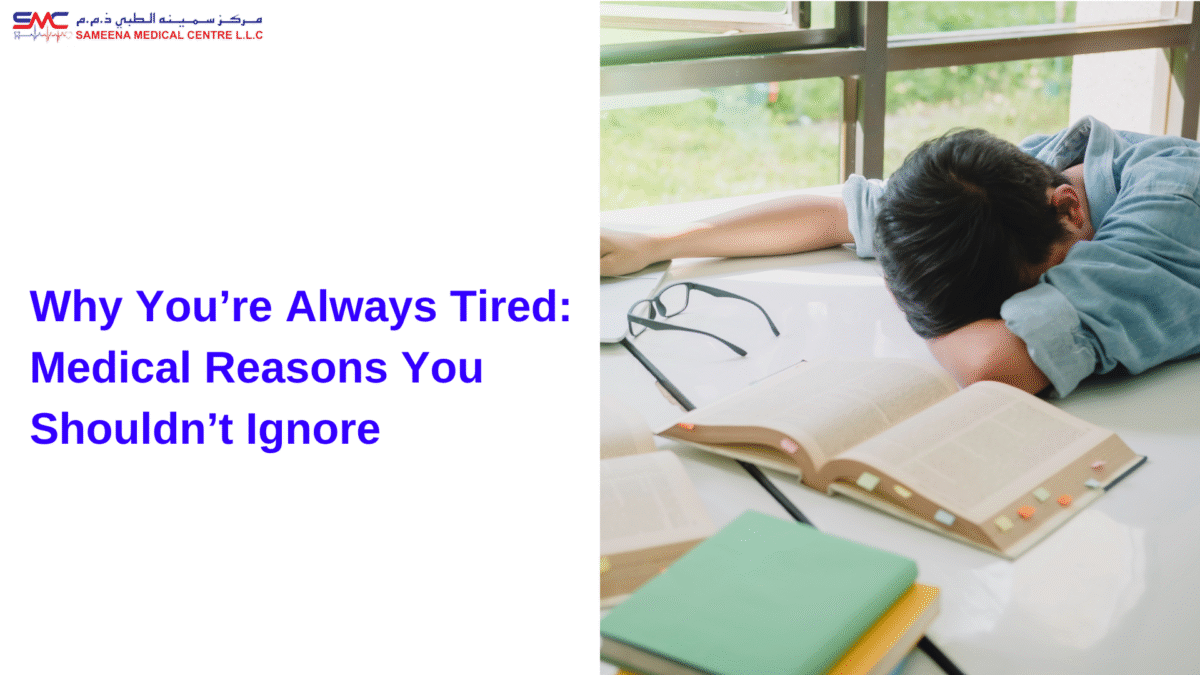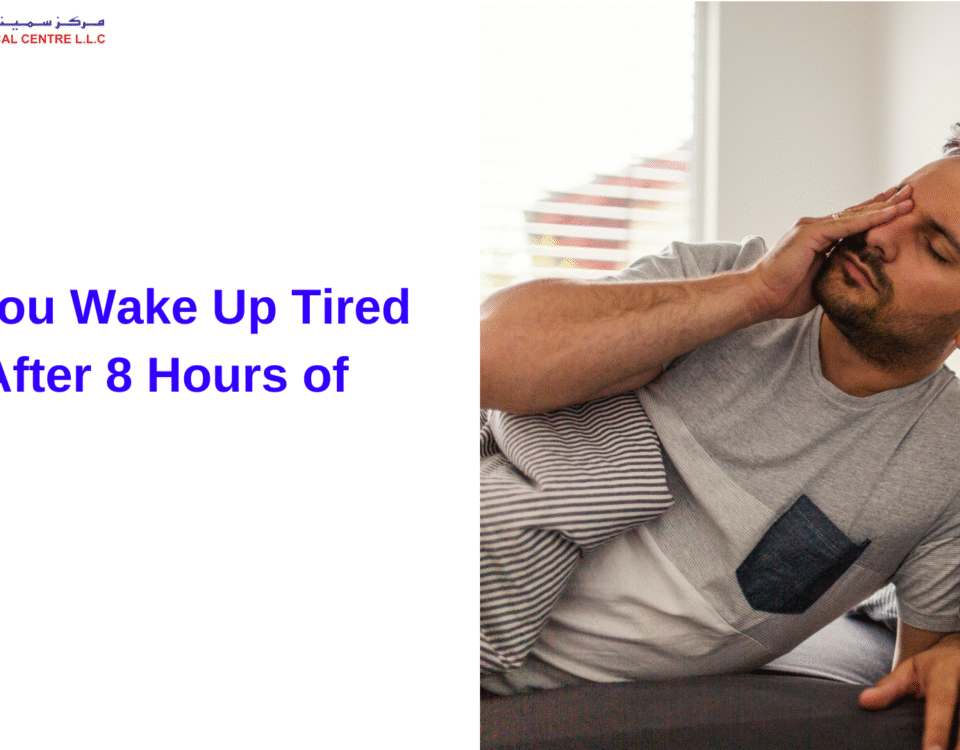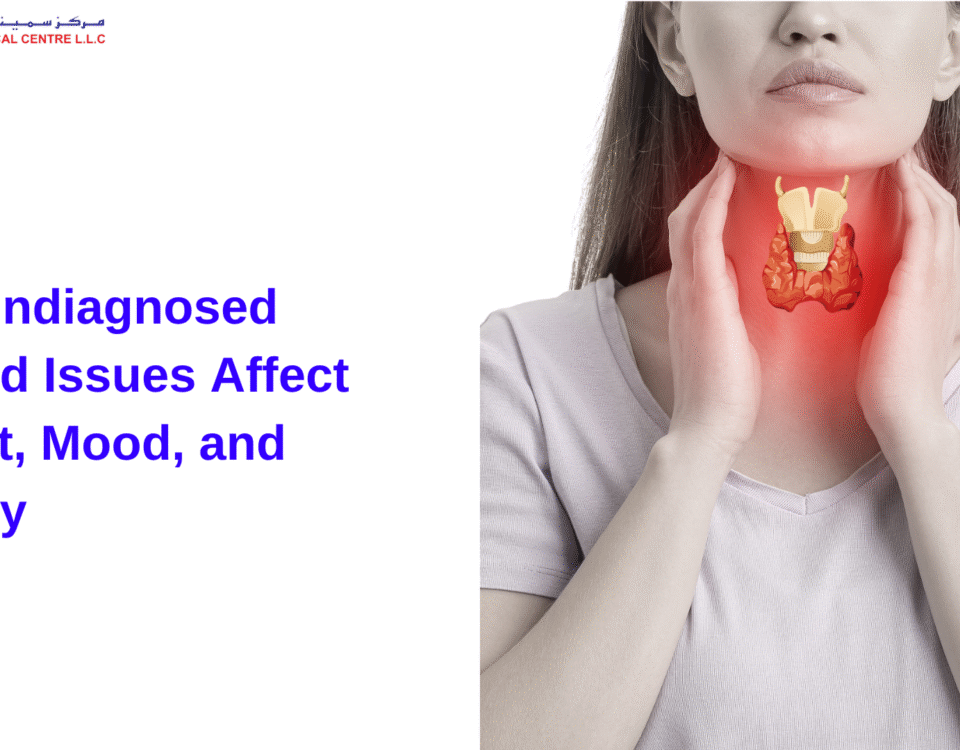
Blood Tests You Should Get Annually
July 3, 2025
The Real Reason Behind Your Constant Headaches
July 10, 2025Why You’re Always Tired: Medical Reasons You Shouldn’t Ignore

Do you constantly feel tired—even after a full night’s rest? Struggling to focus, stay active, or get through your day without yawning? Persistent fatigue isn’t just an inconvenience. It’s often your body’s way of signaling that something deeper is going on. Whether it’s a vitamin deficiency, a hormonal issue, or an undiagnosed condition, ignoring fatigue can delay crucial care.
At Sameena Medical Centre in Sharjah, we frequently see patients experiencing chronic tiredness without understanding the real cause.
This guide outlines the most common medical reasons behind ongoing fatigue and what signs you shouldn’t ignore.
What Does Chronic Fatigue Really Mean?
Fatigue that lingers for weeks, doesn’t improve with rest, and affects your ability to function is called chronic fatigue. Unlike occasional tiredness, chronic fatigue usually points to an underlying medical condition that requires attention.
When Tiredness Is More Than Just Fatigue
Look out for these signs that your tiredness may not be normal:
- You wake up tired despite getting 7–8 hours of sleep
- You struggle with mental clarity or feel “foggy” during the day
- You experience muscle aches, frequent headaches, or low stamina
- Your tiredness has lasted for more than two weeks
Top 5 Medical Reasons You’re Always Tired
Here are five of the most common health-related causes of long-term fatigue:
1. Iron Deficiency or Anemia
When your body lacks iron, it can’t produce enough hemoglobin to carry oxygen through your bloodstream. This means your muscles and tissues aren’t getting the oxygen they need, leaving you weak and exhausted.
Key signs to watch for:
- Pale skin, cold hands and feet
- Shortness of breath during light activity
- Dizziness or lightheadedness
- Unexplained fatigue, especially in women
Iron deficiency is particularly common in menstruating women and those with poor dietary intake.
2. Thyroid Disorders (Hypothyroidism)
Your thyroid controls your metabolism. When it underperforms, your body slows down, including your energy levels. This condition, known as hypothyroidism, often goes undetected until symptoms worsen.
Symptoms may include:
- Constant tiredness despite adequate sleep
- Weight gain
- Feeling unusually cold
- Dry skin or hair thinning
- Depression or mental fog
A simple blood test can confirm thyroid hormone levels, and treatment can significantly improve energy.
3. Vitamin D Deficiency
Although the UAE gets plenty of sun, many people still suffer from vitamin D deficiency due to spending time indoors or wearing sun protection. Low vitamin D affects not only bone health but also energy, immunity, and mood.
Warning signs include:
- General fatigue and body aches
- Low immunity (frequent colds or infections)
- Mood swings or low motivation
- Muscle weakness
Correcting vitamin D levels through supplements or monitored sun exposure can restore energy.
4. Sleep Apnea and Sleep Disorders
You might think you’re getting enough sleep, but the quality matters. Sleep apnea, a disorder where breathing repeatedly stops and starts during sleep, can drastically affect how rested you feel.
Look out for:
- Loud snoring or gasping during sleep
- Morning headaches
- Dry mouth upon waking
- Daytime sleepiness despite 7–8 hours of rest
- Trouble focusing or memory issues
Left untreated, sleep apnea can also raise the risk of heart disease and high blood pressure.
5. Undiagnosed Diabetes
Fatigue can be an early sign of type 2 diabetes, where high blood sugar levels interfere with your body’s ability to convert food into usable energy.
Common early symptoms:
- Frequent urination
- Increased thirst
- Unexplained weight changes
- Blurry vision
- Tiredness after meals
If left unchecked, diabetes can cause long-term organ damage, so early diagnosis is key.
When Should You See a Doctor for Fatigue?
If your tiredness doesn’t improve with rest or continues to disrupt your lifestyle, it’s time to seek medical evaluation. Fatigue that lasts more than a few weeks is not normal, especially if it’s paired with other symptoms like brain fog, weakness, or sleep issues.
A healthcare professional may recommend:
- Blood tests to check for anemia, thyroid, vitamin deficiencies, or blood sugar issues
- Sleep studies to evaluate for apnea or other disorders
- Lifestyle assessments and nutritional screenings
Early diagnosis allows for quicker treatment, better outcomes, and peace of mind.
How Fatigue is Diagnosed and Treated
The right diagnosis starts with a detailed health history. From there, your doctor may recommend a combination of lab tests, sleep evaluations, or imaging to rule out underlying conditions.
Common diagnostic tests include:
- CBC (Complete Blood Count): Checks for anemia or infection
- TSH and T3/T4: Evaluates thyroid hormone levels
- Vitamin D and B12 levels: Nutrient deficiencies linked to energy
- HbA1c or Fasting Glucose: Screens for diabetes or prediabetes
- Polysomnography (Sleep Study): Identifies sleep disorders like apnea
Once the root cause is identified, treatment may involve iron or vitamin supplements, hormone therapy, sleep support devices (like CPAP), or lifestyle changes such as diet and physical activity.
Everyday Habits That Help Combat Fatigue
While medical treatment addresses the root cause, some lifestyle habits can support recovery and prevent recurrence:
- Eat iron- and protein-rich foods: Spinach, red meat, lentils, eggs
- Get safe sunlight exposure: 15–20 minutes per day for vitamin D
- Prioritize sleep hygiene: Go to bed and wake up at consistent times
- Exercise regularly: Even light daily movement boosts energy
- Stay hydrated: Dehydration can cause fatigue and headaches
Small consistent actions often make a big difference in how you feel throughout the day.
Conclusion
Tiredness is a signal, not just a state. If it’s interfering with your quality of life, don’t brush it off as stress or a busy schedule. Chronic fatigue could point to an underlying health issue that deserves attention. Whether it’s anemia, sleep apnea, thyroid imbalance, or something else, identifying the cause early is the key to reclaiming your energy.
Book an appointment with Sameena Medical Centre in Sharjah to get the answers you need and take the first step toward feeling like yourself again.





